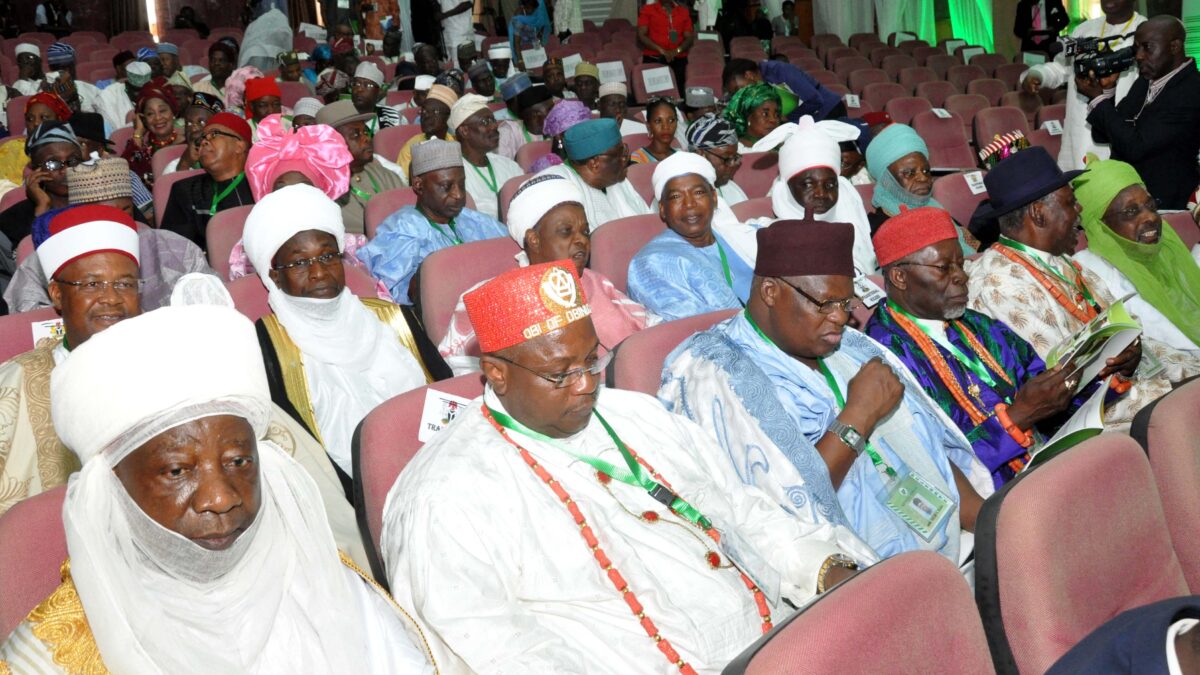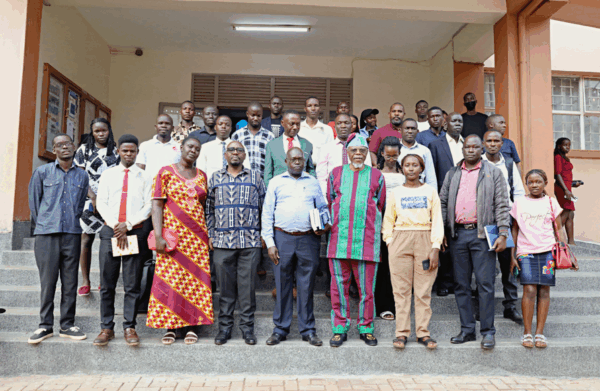
Janus Effects and Nourishing Character with Institutions
April 14, 2024
State Police and 2014 CONFAB’s Polycentric Solution
May 22, 2024The bill granting local governments (LGs) full financial autonomy, approved by the National Assembly (NASS) in March 2022, continues to spark heated debate. According to the bill, each LG could now create its own special LG Allocation Account as the existing State-LG account is repealed. While proponents hail it as a long-overdue step towards grassroots governance, critics, especially the state Houses of Assembly (HoA) raise concerns about its potential implications. There is also a regional opposition to this bill. Fortunately, this contradiction could be resolved in the light of the polycentric resolutions of the 2014 National Conference (CONFAB).
The First Schedule of the 1999 Constitution (as amended) affirms a non-polycentric 774 LGs, meant to be governed by elected councils, but have historically been financially and administratively dependent on state governments who often nominate unelected administrators to manage them. This has hindered their ability to function effectively. As explicitly stated in the Belgore Report, this “violates the spirit of representative governance” where “unelected officials or Sole Administrators” of LGs are nominated by the governors.
Rep. Nkeiruka Onyejeocha (PDP-Abia) who sponsored the Bill argued in November 2016 “The practice of true federalism is lacking in Nigeria, especially at the local government level. Some state governments deprive their local governments of principal source of their revenues. Unless more stable internal source of revenue is exploited, and state-local government joint account abolished, the objective of strengthening local governments relationship with state and federal governments will remain a mirage.’’ President Muhammadu Buhari, also stated in June 2021 AriseTV/This Day interview that “The local government system has been killed.” President Buhari stated this with the governors’ opposition to his Executive Order 10 of 2020 granting financial autonomy to local governments as well as state legislatures.
Proponents believe the LG autonomy bill will lead to improved service delivery, increased accountability, and ultimately, better governance at the grassroots level. Prof. Abubakar O. Sulaiman, Director General, National Institute for Legislative and Democratic Studies (NILDS), argues in March this year “We believe in the local government administration as the closest level of government for effective participation of the teeming population of the country in its governance system.” “It is a struggle we must all fight for and a struggle we must all win,” he said.
Critics, especially several state HoA, are wary of the potential consequences, particularly in the context of the existing power imbalance between states and LGs and the continued federal interference in state affairs, despite the supposed autonomy granted to LGs. They argue that it undermines their authority and could lead to a loss of control over local governance. And they are supported by the Punch Editorial Board in January 2023. The Editorial Board published that “Not minding the motive of the parliamentarians or the sentiments of the organized labour, the state houses of assembly were right to have rejected the bill.”
Citing examples from United States, Australia, Canada, Brazil, Germany, Belgium, Sweden, Switzerland, and other federal systems, the Editorial Board noted “The repudiation is at the heart of true federalism and is consistent with the best global traditions in federal states … In a true federal system, there are two main levers of power – the centre and the federating units,” and that the “1999 Constitution committed a fundamental blunder by listing and recognising the 774 LGs in it as a tier of government” and thus repudiating the Nigeria’s 1963 Constitution. To resolve the crisis of development at the grass roots level, the constitution must be decentralized along federal lines. “
Unfortunately, there are regional concerns too, which complicates the issue. Some have raised the problem of uneven distribution of LGs, with the North having significantly more than the South, and thus holding a significant advantage in terms of LG representation. As a result, they fear that the new law could exacerbate inequalities and further empower the northern states. Secondly, some critics view the financial autonomy law as part of a larger “RUGA” plan, a controversial government initiative aimed at establishing cattle ranches across the country. Generally, critics argue that the federal government’s oversight role could stifle local decision-making and limit the true effectiveness of the bill.
Interestingly, both sides point to American constitutionalism. The proponents of the LG’s financial and administrative autonomy point to the LGs in US and to Alexis de Tocqueville’s Democracy in America. Where he observed that the science of association, which includes local government, is the basis of liberty and the mother of science in a democracy. The critics of the LG bill also rightly cites the American federalism between the Union and the States, that the Nigerian Union must be thoroughly decentralized. Perplexed, one is forced to ask, why this contradiction?
The contradiction is basically caused by the absence of polycentric local government. Polycentricity is a term appropriated by Vincent Ostrom and the Bloomberg School whilst defending the traditional American political order based on Tocqueville’s observations. There are 3 basic elements of polycentricity. First is the existence of many centers for decision making. The second is the existence of a single system of rules (be they institutionally or culturally enforced). And the third is the existence of a spontaneous social order as the outcome of an evolutionary competition between different ideas, methods, and ways of life. The third makes way for choice; joining or exiting a LG or creating a new one.
According to most recent US Census conducted in 2022, the total number of U.S. LGs, including county (3,031), township and municipal (35,705), independent school districts (12,546) and other special-purpose entities (39,555), was 90,837. Each LG enjoys substantial autonomous of determining its own policies, budget without directly control by a parent government. What is interesting is that whilst there were 90,837 LGs in 2022, they were 155,067 in 1942. The contraption is possible because of the possibility of polycentricity. To understand what polycentricity could mean to Nigeria, one only need to consult the 2014 CONFAB.
The CONFAB recognized LGs as a layer of governance closest to the people and, in effect, a platform for sustainable socio-economic development and popular participation in governance at the grass-root.”(p. 281) And whilst acknowledging the “alleged abuse” of the LG system by “State administrations,” the CONFAB also introduced some necessary polycentric safeguards to guarantee the independence of LGs.
It gives the states jurisdiction to create or reduce the number of local governments. “The number, structure, form and administration of Local Governments shall be determined by the States.” Furthermore, the list and functions of LGs in the Schedules of the 1999 Constitution are removed and transferred to the States to be covered by a law of the State HoA. The HoA of a State may also by law confer other functions on the LG. These account for the third element of polycentricity.
CONFAB also provides for the second polycentric element; a single system of rules. Chairmen and Councilors of LGs, not democratically elected, shall be illegal. Furthermore, the CONFAB, following the wisdom presented by the National Union of Local Government Employees (NULGE) and the Report of the Presidential Committee on Review of Outstanding Issues from Recent Constitutional Conferences 2012 (the Belgore Report) recommends that “Joint State/Local Government Account be scrapped and replaced with a State Revenue Mobilization, Allocation and Fiscal Commission (SRMAFC) with representatives of LGs and a Chairman nominated by the Governor.” CONFAB also includes more provisions to protect the representatives of LGs in this Commission.
On the first polycentric element; the existence of many centers for decision making, the CONFAB proposes enormous responsibilities for the indigenous rulers and polities in the policing the borders (p114, 251), conflict resolution (p 92), screening and vetting prospective police recruits (259) … and so on. And whilst the 2014 CONFAB does not clearly constitutionalize the indigenous polities towards the existence of many centers for decision making, the Conference clearly points to it. These enormous responsibilities cannot be successfully achieved without constitutionalizing the indigenous polities.
This leads us another Nigerian contradiction of “two publics,” which according to Peter Ekeh entails the fracturing of the public into two; of the constitutionally excluded moral and primordial public, and the amoral civil public who replaced the colonial masters. As Ekeh noted, such two publics are absent in the West. This amoral public is unfortunately the despicable arena of unresponsively corrupt pan-tribalists and prebendalists, and the genesis of all our developmental and security challenges. Polycentricity, itself would not work if the two publics are not de-colonized into one single polycentric public within every local government, where both the democratic public and the primordial public would constitute two complementing centers for decision making with a single system of rules, be they institutionally or culturally enforced.
Also Read : Polycentricity and De-colonizing the Two Publics
The contradiction in the long run is the absence of polycentric governments in a federal system copied from US. The dependence of the LGs on the States stems from the country’s non-polycentric federal structure, where states hold significant power over local units and the overcentralized federal structure holds significant power over the States. The problem of local governments can only be tackled within a larger clinical process of restructuring. To resolve the crisis of development at the grass roots level, the constitution must be decentralized along federal lines, without these shameful contradictions.
Punch Editorial Board is right after all. “The 1999 Constitution committed a fundamental blunder by listing and recognising the 774 LGs in it as a tier of government.” Ultimately, the success of this initiative will depend on its careful polycentric implementation, addressing the concerns of stakeholders, and ensuring true financial and administrative autonomy for local governments across the country. And this must be achieved bottom-up towards the Nigerian Dream.





